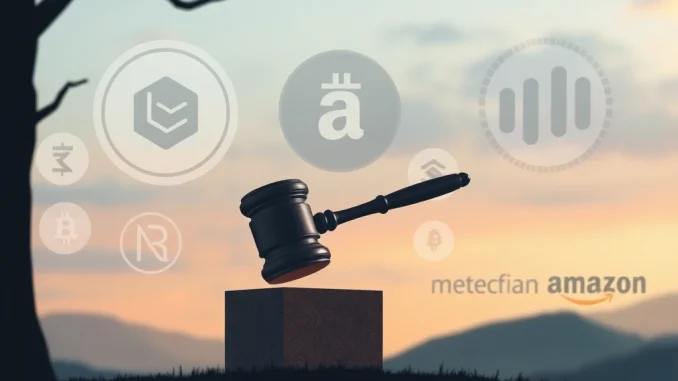
Big news is circulating in the world of cryptocurrency regulation! A significant amendment to a proposed US stablecoin bill, known as the GENIUS bill, is making waves. This development, highlighted by Crypto in America host Eleanor Terrett, signals a stricter approach to how stablecoins operate within the United States, particularly targeting misleading practices and the involvement of large technology companies.
Understanding the Latest Stablecoin Regulation Efforts
The push for comprehensive stablecoin regulation in the U.S. has been ongoing, aiming to bring clarity and stability to this critical segment of the crypto market. Stablecoins, designed to maintain a stable value relative to a specific asset (like the U.S. dollar), play a vital role in trading and transfers within the digital asset ecosystem. However, concerns about reserves, consumer protection, and systemic risk have prompted lawmakers to act.
The proposed GENIUS bill amendment introduces several key provisions:
- Banning False Claims: It explicitly prohibits stablecoin issuers from making false claims, such as suggesting they have FDIC insurance when they do not. This aims to protect consumers from being misled about the safety of their funds.
- Restricting Naming Conventions: The amendment would ban the use of U.S.-related terms in stablecoin names if they are not issued by properly regulated entities, preventing tokens from falsely implying official endorsement or backing.
- Addressing Big Tech Involvement: Perhaps one of the most discussed aspects, it places significant restrictions on non-financial public companies, including giants often referred to as Big Tech stablecoins, from issuing stablecoins.
Why is Crypto Regulation US Focused on Big Tech?
The focus on Big Tech stablecoins stems from concerns about their potential scale and influence. Companies like Meta (formerly Facebook) and Amazon have vast user bases and financial resources. Allowing them to issue their own stablecoins without robust oversight could potentially create monopolistic power, raise significant privacy issues, and pose systemic risks to the traditional financial system if not properly regulated. The amendment requires these firms to meet stringent financial and consumer protection standards before entering the stablecoin space.
Diving Deeper into the GENIUS Bill Amendment
Beyond the headline restrictions, the GENIUS bill amendment also aims to strengthen the regulatory framework:
- Enhanced Enforcement: It grants regulators stronger powers to oversee stablecoin activities and ensure compliance.
- Ethics Rules: New ethics rules are introduced for government employees involved in digital asset matters, aiming to prevent conflicts of interest.
- Increased Penalties: Noncompliance with the new rules would face enhanced penalties, providing a stronger deterrent against violations.
These measures collectively signal a serious legislative effort to bring stablecoins under a clear and enforceable regulatory umbrella in the United States.
What Does This Mean for the Future of Stablecoins and Crypto?
The potential passage of this amendment could have significant implications. For consumers, it promises greater protection against fraudulent claims and potentially more stable and reliable stablecoin options from regulated entities. For businesses, it creates clear, albeit potentially strict, guidelines for stablecoin issuance and operation within the U.S.
The restrictions on Big Tech stablecoins also highlight a broader debate about the role of large corporations in the future of finance and digital assets. While their innovation could drive adoption, concerns about their market power are clearly influencing legislative direction.
Navigating the evolving landscape of crypto regulation US is crucial for anyone involved in the space. This amendment is a key piece of that puzzle, reflecting lawmakers’ increasing focus on consumer safety and market integrity.
In Summary
The proposed amendment to the US stablecoin bill, the GENIUS bill, represents a critical step in solidifying stablecoin regulation in the United States. By targeting false claims, restricting Big Tech stablecoins, and bolstering enforcement, the amendment aims to create a safer and more transparent environment for digital assets. As discussions continue, market participants will be watching closely to see how these proposed rules shape the future of stablecoins and the broader crypto regulation US landscape.



